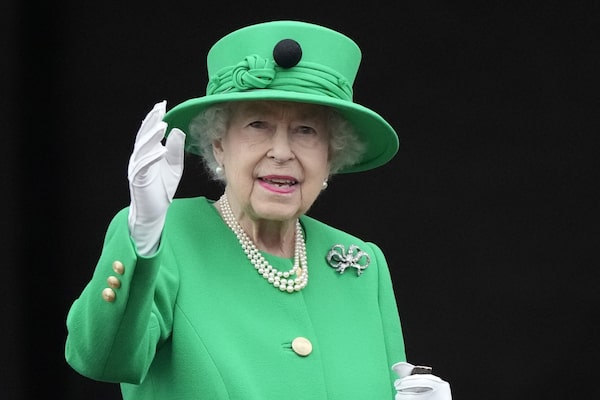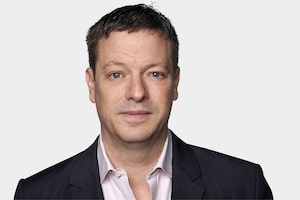
Queen Elizabeth II waves to the crowd during the Platinum Jubilee Pageant at Buckingham Palace in London on June 5.Frank Augstein/The Associated Press
As King Charles stood before the British Parliament Monday and recalled his mother’s youthful pledge to “maintain the precious principles of constitutional government,” it was hard to avoid thinking that her 70-year era of stable and transparent constitutional monarchy had ended.
Queen Elizabeth will be remembered as the English-speaking world’s first full-fledged professional constitutional monarch. And there is a good chance that she was its last.
To understand why, you need to look back to the middle decades of the 20th century, when Britain and its colonies faced a problem that once again seems relevant: Their system of constitutional monarchy no longer seemed viable in a modern, increasingly democratic world. The very phrase sounded like an oxymoron.
The problem was an absence of credible constitutional monarchs. The abdication of King Edward VIII in 1936, and his subsequent very visible support of Adolf Hitler, had done immeasurable damage to the image of an aloof, impartial and mainly symbolic monarchy. His brother, King George VI, was seen as ruling only reluctantly while many former colonies were abandoning the monarchy.
The solution devised by George and his family was to manufacture an ideal constitutional monarch, one who embodied the definition of the role. Their vessel for this experiment would be the King’s eldest daughter, Elizabeth.
From age 13, Princess Elizabeth was given years of intense, one-on-one tutoring in the theory of constitutional monarchy, enthusiastically studying the two Victorian scholars who had codified the concept, William Anson and Walter Bagehot.
She took to heart Bagehot’s famous description, in his 1867 work The English Constitution, of the sort of person a constitutional monarch must be: “It should be evident that he does no wrong. He should not be brought too closely to real measurement. He should be aloof and solitary. [The monarchy] seems to order, but it never seems to struggle. It is commonly hidden like a mystery, and sometimes paraded like a pageant, but in neither case is it contentious.”
Bagehot continued: “The nation is divided into parties, but the Crown is of no party. Its apparent separation from business is that which removes it both from enmities and from desecration, which preserves its mystery, which enables it to combine the affection of conflicting parties, to be a visible symbol of unity to those still so imperfectly educated as to need a symbol.”
Elizabeth made those words her life’s mission. From her accession to the throne in 1952 and for the next 70 years, she showed an almost monastic devotion to Bagehot’s notion of a “dignified” head of state.
It is not that her son King Charles III is untrained in constitutional monarchy – his speeches and written works suggest an equally deep knowledge of the subject.
The problem is that there has been a gap of more than 70 years during which Charles embroiled himself deeply and personally in business, in political positions, in world events and in finance to such an extent that he will never be seen as impartial or aloof or mysterious.
In this sense, he resembles his royal ancestors of the 19th and early 20th centuries, who were deeply tied up in politics to an extent that would never be tolerated today.
“Walter Bagehot was supposed to be describing Queen Victoria, but the reality is that Queen Victoria was not exactly above partisanship, she was not exactly a figure of unity – she was very pro-Conservative, especially in her relationship with [Tory] Prime Minister Disraeli,” says Catherine Marshall, professor of British studies at CY Cergy Paris University.
“But what he wrote at the time,” Dr. Marshall says, “became a reality with Elizabeth II – Elizabeth embodied what Walter Bagehot believed that a constitutional monarch should embody … she kept scrupulously to the line of what Bagehot was saying.”
Charles, during his 63 years as Prince of Wales, did not keep to that line.
He has certainly not been “aloof and solitary” or “hidden like a mystery.”
There were the “black spider” letters – so named in reference to his handwriting – which he sent to dozens of cabinet ministers and senior officials in the 1990s and 2000s, lobbying them directly on issues ranging from agricultural policy to foreign policy to architecture, sometimes asking them directly for grants and donations to his organizations.
Nor was he “separate from business.” Those organizations were not simply charities and worthy causes. As Prince of Wales, he (and now his son William) was owner of the Duchy of Cornwall, a vast land-holding and agricultural enterprise worth more than a billion pounds. It is a lucrative role: For example, whenever anyone in Cornwall dies intestate (that is, without a will or an obvious heir), their property goes to the Duchy.
Charles, during the 1980s and 1990s, turned the Duchy into a lucrative business focused on real estate development and food products. Officially a not-for-profit enterprise, in 2021-2022 it paid him a salary of £23-million ($34.96-million), up from £20.4-million ($31.01-million) in 2020-2021. Charles has voluntarily paid income tax on these earnings, but because the Duchy is not officially a company, he is exempt from corporate and capital-gains taxes.
In 1990, Charles created his food-production company Duchy Originals, which by the 2000s was supplying the countrywide Waitrose supermarket chain with its premium brand of meats, prepared meals, bottled mineral water, beer, herbal medicines and other upmarket products; last year, the brand (now known as Waitrose Duchy Organic) reported a profit of £3.6-million ($5.47-million).
He has been exceedingly partisan on a number of issues, some considered worthy and others more questionable. He has been an outspoken advocate of homeopathic, naturopathic and other pseudomedical causes that medical professionals consider misleading if not outright dangerous (his company has sold such cures). He is an opponent of genetically engineered foods, even socially beneficial ones, and has lobbied officials to ban them.
His battles to reshape the London skyline in his preferred neoclassical style have been legendary. In one of several examples, in 2009, he had Richard Rogers, arguably Britain’s most acclaimed architect, sacked from a mammoth project to redesign the Chelsea Barracks, after Charles had successfully lobbied the project’s financier, Qatari royal-family member Sheik Hamad bin Jaber Jassim al-Thani, to replace him with an architect closer to Charles’s conservative circle.
After decades of such scuffles and controversies, it’s unlikely that Charles’s Sept. 9 pledge to step away from the “charities and issues for which I cared so deeply” will ever be fully credible. There is no “mystery,” in the way Walter Bagehot meant the word, in Charles.
It creates a situation similar to that of the 1930s and 1940s – without a credible, professional constitutional monarch, many will begin to wonder why we continue choosing heads of state this way. During Elizabeth’s lifetime, many countries, including Germany and Ireland, found ways to have purely symbolic, neutral heads of state who didn’t earn their position by being born to the right family.
There are signs that Charles’s son, William, has been raised, like Elizabeth, to be an efficient head-of-state machine, and he seems to embrace that role. The question is whether, by the time he is handed the Crown, the phrase “constitutional monarchy” will retain any of the innocuous and dignified meaning it took on during Elizabeth’s rather unique 70 years of duty.
 Doug Saunders
Doug Saunders